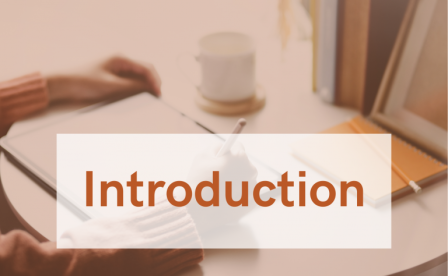Critical reading: introduction
Duration: 1 min 42 secs
Share this media item:
Embed this media item:
Embed this media item:
About this item

| Description: | Introductory video for 'An introduction to critical reading: Breaking it down' |
|---|
| Created: | 2023-07-24 17:17 | ||||
|---|---|---|---|---|---|
| Collection: | CamGuides | ||||
| Publisher: | University of Cambridge | ||||
| Copyright: | Cambridge University Libraries | ||||
| Language: | eng (English) | ||||
| Keywords: | critical; reading; note-making; | ||||
| Credits: |
|
||||
Transcript
Transcript:
Introduction Slides
Welcome to this critical reading course designed by librarians in collaboration with the Cambridge Information Literacy Network and Cambridge University Libraries. Your teachers today will be myself, Lucy Woolhouse, the Reader Services Librarian at Queens College, and my colleague, Paul Cooke, the Library Manager at the Seeley Historical Library. The course is designed to last roughly 45 minutes, but please work at your own pace if you need longer to do a task then that is absolutely fine. This course is designed to give you techniques for reading scholarly literature. We will do this by looking critically at an article and asking ourselves some questions. You can see on the slide through doing this, you'll be able to look for key areas in the article, which will help you to answer the questions you've been set. This will help you become an efficient reader as you will be able to locate the key ideas more easily. We would argue that this is better than being a speed reader as it helps you to take in all the points made by the author. You will then be able to read with purpose, which will help you to answer the questions you've been set and make better notes so that you can more easily use your reading in your assignments. By the time you finish a book or article, you should be able to identify the questions that inspire you to read further and know what it is that you need to look at next. All of this should help you to feel more confident in your critical reading skills and help you to form your own ideas when writing your assignments.
Welcome to this critical reading course designed by librarians in collaboration with the Cambridge Information Literacy Network and Cambridge University Libraries. Your teachers today will be myself, Lucy Woolhouse, the Reader Services Librarian at Queens College, and my colleague, Paul Cooke, the Library Manager at the Seeley Historical Library. The course is designed to last roughly 45 minutes, but please work at your own pace if you need longer to do a task then that is absolutely fine. This course is designed to give you techniques for reading scholarly literature. We will do this by looking critically at an article and asking ourselves some questions. You can see on the slide through doing this, you'll be able to look for key areas in the article, which will help you to answer the questions you've been set. This will help you become an efficient reader as you will be able to locate the key ideas more easily. We would argue that this is better than being a speed reader as it helps you to take in all the points made by the author. You will then be able to read with purpose, which will help you to answer the questions you've been set and make better notes so that you can more easily use your reading in your assignments. By the time you finish a book or article, you should be able to identify the questions that inspire you to read further and know what it is that you need to look at next. All of this should help you to feel more confident in your critical reading skills and help you to form your own ideas when writing your assignments.
Available Formats
| Format | Quality | Bitrate | Size | |||
|---|---|---|---|---|---|---|
| MPEG-4 Video | 640x360 | 432.82 kbits/sec | 5.39 MB | View | ||
| WebM | 640x360 | 231.99 kbits/sec | 2.92 MB | View | ||
| iPod Video | 480x360 | 478.79 kbits/sec | 5.96 MB | View | ||
| MP3 | 44100 Hz | 251.18 kbits/sec | 3.13 MB | Listen | ||
| Auto * | (Allows browser to choose a format it supports) | |||||

